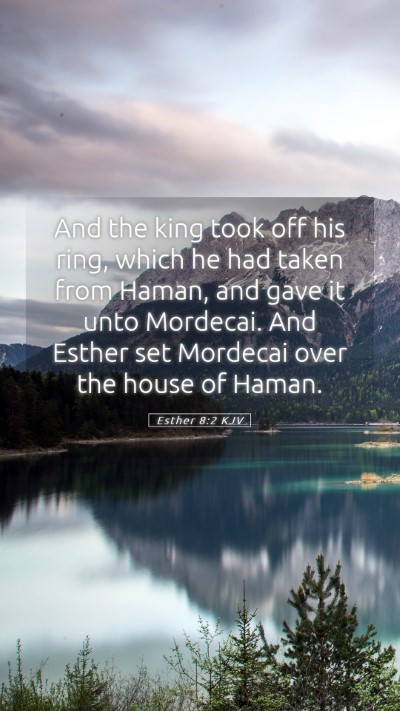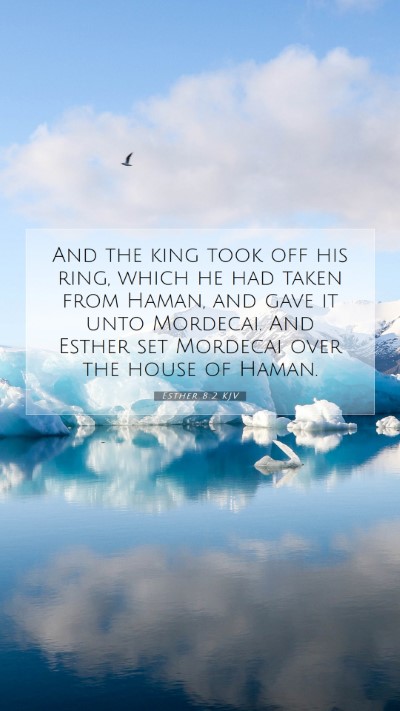Old Testament
Genesis Exodus Leviticus Numbers Deuteronomy Joshua Judges Ruth 1 Samuel 2 Samuel 1 Kings 2 Kings 1 Chronicles 2 Chronicles Ezra Nehemiah Esther Job Psalms Proverbs Ecclesiastes Song of Solomon Isaiah Jeremiah Lamentations Ezekiel Daniel Hosea Joel Amos Obadiah Jonah Micah Nahum Habakkuk Zephaniah Haggai Zechariah MalachiEsther 8:2 Meaning
What is the meaning of Esther 8:2?
And the king took off his ring, which he had taken from Haman, and gave it unto Mordecai. And Esther set Mordecai over the house of Haman.
Esther 8:2 Bible Verse Meaning
Esther 8:2 - Understanding the Significance
Esther 8:2 states: "And the king took off his ring, which he had taken from Haman, and gave it unto Mordecai. And Esther set Mordecai over the house of Haman."
This verse marks a significant turning point in the narrative of Esther. It represents not only a personal elevation for Mordecai but also the divine reversal of fortune for the Jewish people.
Verse Explanation
The act of the king giving his ring to Mordecai symbolizes authority and honor. According to Matthew Henry, the king’s actions indicate a transfer of power and trust from Haman, the antagonist, to Mordecai, who represents the oppressed Jewish people. This dynamic shift emphasizes God’s providence in seemingly dire circumstances.
Albert Barnes emphasizes the significance of the king’s act as an endorsement of Mordecai’s loyalty and capability. Mordecai's new position allows him to safeguard the Jewish community, illustrating how God empowers those who are faithful to Him.
From Adam Clarke's perspective, it reflects the theme of justice as Haman, who plotted against the Jews, is replaced by one of their own. This not only brings security to the Jewish people but also underscores the reversal of their fate.
Insights from Public Domain Commentaries
- Historical Context: Understanding the historical backdrop is vital for grasping the full meaning of this verse. The threat against the Jews had been a significant concern, and Mordecai’s rise becomes a testament to divine intervention.
- Character Development: The transformation of Mordecai from a humble servant to a man of influence reflects the narrative's progression towards hope and restoration.
- Divine Justice: The passage encapsulates the biblical theme of justice, where evil intentions lead to downfall, as in the case of Haman, while the righteous are elevated.
Bible Study Insights
For those engaged in Bible study groups or online Bible study, Esther 8:2 offers rich material for discussion. It invites reflections on God’s sovereignty and the unexpected means through which He works.
Practical applications may include the importance of faithfulness and the assurance that God can use individuals to fulfill His purposes, even in challenging times.
Cross References
Esther 8:2 can be related to the following verses:
- Proverbs 21:1: “The king’s heart is in the hand of the Lord, as the rivers of water: he turneth it whithersoever he will.”
- Esther 4:14: “For if thou altogether holdest thy peace at this time, then shall there enlargement and deliverance arise to the Jews from another place; but thou and thy father’s house shall be destroyed.”
- Luke 1:52: “He hath put down the mighty from their seats, and exalted them of low degree.”
Conclusion
The meaning of Esther 8:2 resonates through its themes of providence, justice, and the elevation of the oppressed. As believers engage in Bible study insights and seek deeper Bible verse explanations, this verse stands as a reminder of the faithfulness of God in turning circumstances for His glory and the good of His people.


